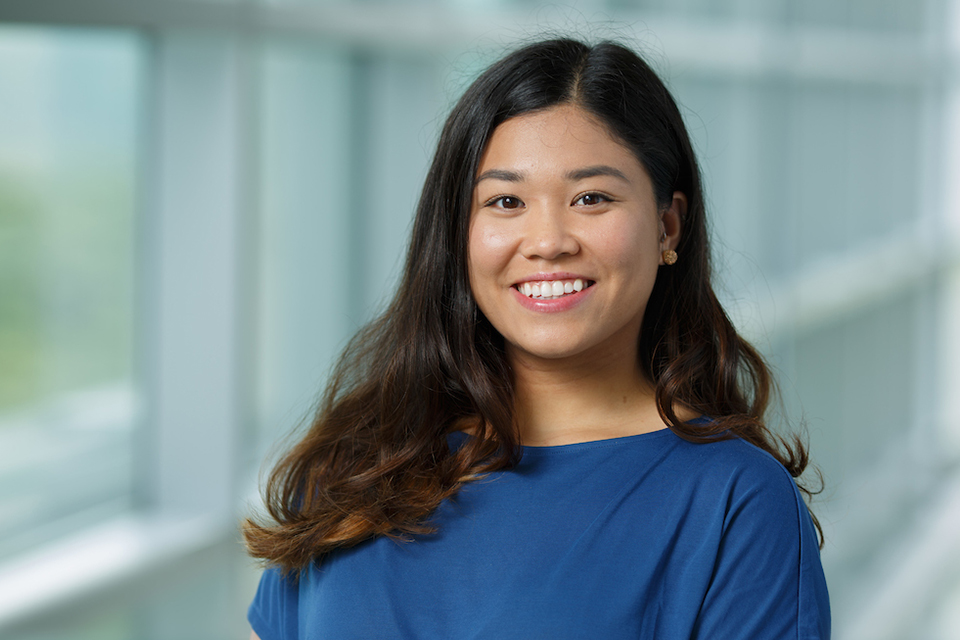Graduate Students in Neuroscience Maintain a Sense of Community During the COVID-19 Pandemic with a Student-led Mentorship Program

June 22, 2021
Carey Slaeker | Graduate School of Arts and Sciences
For Hannah Germaine, commencing graduate studies during a global pandemic was not what she had planned. “It was a really odd experience,” she says, “and there were many moments when I felt like I really wasn’t in a graduate program because I was at home.” Germaine’s experience reflects that of many first-time graduate students across the world who struggled to maintain connections with peers during the period of lockdowns and social distancing. This proved to be a particularly acute problem for students in the Division of Science at Brandeis, as peer interaction, mentoring, and lab rotations are essential components of the University’s approach to education.
Fortunately for Germaine, students in the Neuroscience Department realized that the pandemic created an opportunity to embrace the Brandeis values of inclusiveness and collaboration in a new way. The lockdowns threatened to drastically diminish the interconnective experience that new graduate students enjoy when first joining the program, and the senior graduate students—who often refer to themselves as a neuroscience “family”—expressed these concerns to the faculty. Hillary Rodgers recalls: “Because the pandemic makes it harder for everyone to connect, it was important to us that incoming students felt supported given the new challenges in community building.”
In order to address these challenges, Graduate Department Representative (GDR) Jasmine Quynh Le worked with students and faculty in the program to create one-on-one peer-mentorship opportunities between senior graduate students and incoming first year students in the hopes that it might help alleviate some of the negative impacts of social-distancing. Bradly Stone, who would become one of the peer-mentors, recalls, “We took a page from the Molecular Cellular Biology program's book, which has been doing a mentoring program for two years now. We agreed with their philosophy: Graduate school can be made easier if a guiding hand is there for assistance.”
Such a philosophy is not new to the Sciences at Brandeis. In fact, the idea of a peer-mentorship program supplements the intrinsic structure of training and mentorship built into the pedagogical approach in the Division of Science. Under pre-pandemic conditions, first-year students rotate through four different research labs. In order to guide students through this process, the Neuroscience Department facilitates mentoring opportunities between first-year students, faculty rotation advisors, and graduate/postdoctoral/research staff lab members. This professional, “inside-the-lab” mentoring practice has been effective in facilitating valuable training as well as relationship-building for first-year graduates in the program.
However, with social distancing restrictions, Le worried that incoming students would need extra social interaction in order to properly integrate into the Neuroscience community. “We want to make sure that students have the opportunity to meet people outside of the lab,” Le says. The resulting fully student-run mentorship program focuses on creating low-stake and informal social connections between students in addition to the more formal and research-centered connections made in the lab with rotation advisors. Thus, incoming first-years enter the program with at least two consistent peer-mentors to turn to for support: one inside the lab guiding them through rotations and one outside the lab helping them integrate into the program.
Due to Le’s efforts and robust support from fellow peer-mentors, the peer-mentorship program is bringing graduates together in simple but effective ways. “The Division of Science has given us money to cover coffee costs,” says Le. “Basically we’ve been encouraging everybody to grab coffee and check in with their mentors.” Depending on the pair’s comfort level with in-person meetings during the pandemic, mentors and mentees meet together regularly either on campus or virtually. These conversations enable mentors to connect with the incoming students and check on their progress.
These efforts have enabled first-year mentees like Natasha Baas-Thomas to feel more connected in the program. “My experience with the peer-mentorship program hasn't been about advice-giving or professional development exactly,” she says, “but more about having someone with whom you can talk and share your experience.” For Baas-Thomas, meeting with her mentors has meant becoming part of the community. “Talking about different scientific interests, venting about stresses, etc. helps me feel more connected to other students, which, in turn, enhances my sense of community within the Neuroscience program.”
Graduate mentors have also benefited from the sense of community fostered by the program. “It's just great to be more connected during a time when it's too easy to become isolated,” says mentor Hillary Rodgers. But even outside of the pandemic experience, opportunities like these are welcomed by advanced Neuroscience candidates. “In the sciences, many students lose touch beyond the second year, when they typically finish required coursework and teaching duties,” Rodgers explains. “The mentoring program is a really nice way to help us form connections with students we might not otherwise see very often.” In this way, peer-mentorship has provided both advanced and beginning graduates with increased community involvement.
When Hannah Germaine began as a first-year graduate, she, like many others, was forced to adapt to a “new normal” that left her feeling isolated at home. “It was definitely a challenge,” she recalls. However, thanks to this student-led effort, she was able to bridge a social gap created by the pandemic. For Germaine, this means that she not only received the support she needed to excel in her program, but she also received the interpersonal connection that the pandemic threatened to eliminate. “Not only did my mentors help answer questions,” she says, “but they became friends in the program that, working remotely, I wouldn't have made otherwise.”






